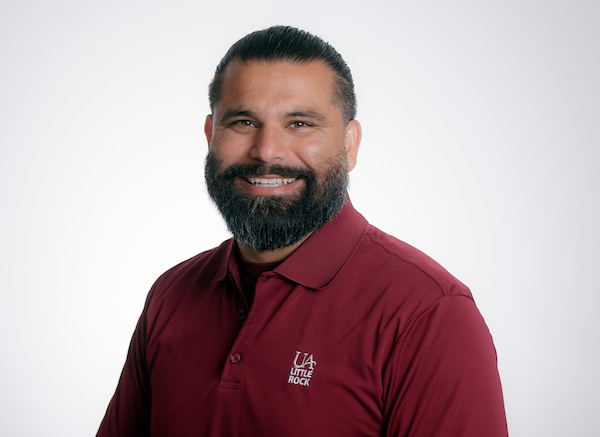Assadi Researches Why Male College Students Are Reluctant to Seek Counseling

As head of Counseling Services at UA Little Rock, Dr. Aresh Assadi has counseled many college students during his 13 years at the university, but there is one question that has often plagued him early on in his career.
Why do so few male college students seek counseling when compared to women?
“We kept finding that men went to therapy far less than women, usually at a rate of 3 to 1,” Assadi said. “I wondered if this was a coincidence or something that just happened at our campus. There is definitely a gap in treatment that needs to be addressed.”
To find the answer, Assadi made this the research focus of his dissertation, “Masculinity, Mental Health, and Attitudes on Willingness to Seek Help in Male College-Aged Students.”
Despite the numerous studies suggesting that psychological treatments are equally efficacious for men and women, many men continue to exhibit reluctance toward seeking treatment for their psychological concerns. This significant gender disparity in mental health services utilization persists despite the mental illness severity. There are many quantitative studies regarding men’s help-seeking behaviors, but qualitative investigations into this phenomenon are scarce.
Assadi’s research involves data analysis from 12 in-depth interviews conducted with male college students. He found that adherence to traditional masculinity norms, stigma, and a lack of mental health literacy were the three most cited reasons why men did not go to therapy.
“The male college students wanted to be perceived as masculine, and you can see how that attitude might not mesh well with the counseling and help seeking process,” Assadi said. “A lot of men are socialized to behave a certain way. They want to be perceived as masculine, independent, and tough. Admitting you have a problem and asking a stranger for help can be an uncomfortable experience for many men. When men feel that they are falling short of these masculine ideals, stigma may occur. The third issue is a lack of mental health literacy, which is the ability to recognize, understand, prevent, and treat mental health issues.”
Assadi found that the men he interviewed actually thought it was fine for men to go to counseling, but had a blind spot when it came to their own mental health.
“Men saw the importance of going to therapy, just not for themselves,” Assadi said. “They think it’s okay for other people to go to therapy, but they don’t extend that same grace to themselves. So they mask, minimize, or compartmentalize their mental health problems. But if this was happening to a friend, they would want their friends to tell them that they were struggling right away. They were more comfortable in the role of helper than the helped.”
There are many solutions to encourage men in college to seek counseling. First off, universities can increase mental health literacy on campus by holding programming that makes mental health a visible topic on campus. Counseling Services can also educate students, faculty, staff, academic advisors, and residential assistants about how to refer students to counseling.
Another solution is to reduce the stigma that goes along with seeking counseling. Technology is an excellent way to combat stigma since online counseling sessions decrease the barrier to mental health access. Seeing a counselor from the comfort of your dorm room is a lot less intimidating than going to an office where you might be recognized, Assadi said.
“We can also use marketing to rebrand masculinity as incorporating mental health,” Assadi said. “We’ve all heard of toxic masculinity. Positive masculinity uses masculine traits as reasons for going to counseling. One example is responsibility. A man takes responsibility for their own mental health.”
Assadi presented his research at the American Educational Research Association Annual Meeting in Chicago, the world’s largest gathering of education researchers and a showcase for groundbreaking, innovative studies.
Assadi also discussed his findings on an Aug. 27 episode of “The Suicide Prevention Lady Podcast” with Dr. Rikki Turner, suicide intervention expert. He gave insight about how mental health affects men and tips on how to navigate the shame and stigma for this population.
